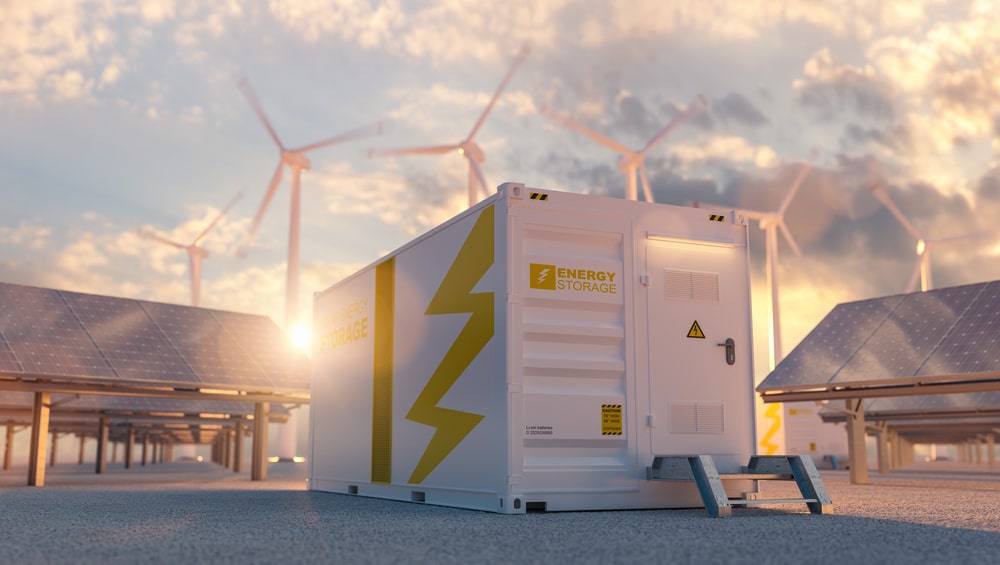
Article At A Glance
- System capacity and scalability should be considered to avoid inefficiencies as your business grows.
- The type of battery used affects efficiency, cost, and longevity, making it an essential factor in decision-making.
- Solar storage life expectancy greatly impacts the return on investment, making regular maintenance and careful monitoring important.
As more businesses turn to renewable energy, solar power has become popular for reducing energy costs and promoting sustainability. A reliable energy storage system is crucial to maximize the benefits of solar energy. Solar energy storage ensures access to power even when the sun isn’t shining, which is essential for maintaining a consistent energy supply.
In this guide, we’ll discuss the key factors to consider when selecting a solar energy storage system for your business. From understanding your energy needs to choosing the right battery type, this comprehensive guide will help you make an informed decision.
Factors To Consider When Choosing a Solar Energy Storage System
Selecting the right solar energy storage system is an investment that requires careful consideration of your business’s energy demands and operational needs. Below are the most important factors to keep in mind.
Energy Needs and Consumption
The first step in choosing the right system is understanding your energy consumption. This entails analyzing your business’s electricity usage patterns, including peak and off-peak times and the energy required during these periods. A thorough energy audit can help identify your needs and ensure your storage system can handle regular consumption and unexpected surges.
If your business operates in a region prone to power outages, you’ll want a system with enough storage to keep operations running smoothly, even during extended downtimes. Investing in reliable backup power solutions can safeguard your business against unexpected disruptions.
System Capacity and Scalability
Capacity is a critical consideration when evaluating solar storage. The system’s capacity refers to how much energy it can store at a given time, typically measured in kilowatt-hours (kWh). Choose a storage system with a capacity that aligns with your energy consumption to avoid under- or over-sizing, both of which can lead to inefficiencies.
Scalability is another factor to consider. As your business grows, your energy needs may increase. A scalable storage system allows you to expand capacity by adding more storage units without a complete overhaul.
Battery Chemistry and Durability
The type of battery used in a solar energy storage system significantly affects its efficiency, cost, and longevity. Different batteries have distinct chemistries, affecting how they store and release energy. Choosing the right battery can greatly enhance the overall performance of a solar system.
When selecting a battery, it’s crucial to consider factors such as capacity, depth of discharge, and temperature tolerance. These aspects can influence both short-term functionality and long-term durability. Understanding each battery type’s environmental impact and lifespan can guide informed decisions, ensuring a sustainable and cost-effective solar energy solution.
Solar Storage Life Expectancy
One of the most critical factors when selecting a solar energy storage system is its lifespan. On average, lithium-ion batteries last between 10 and 15 years, while lead-acid batteries may only last 5 to 10 years. Technological advances continually improve battery life, making exploring options that offer the longest return on investment worthwhile.
Regular maintenance and careful monitoring of the system’s performance will also help maximize its lifespan. Some storage systems have warranties that cover replacements or repairs for several years, providing peace of mind.
Types of Solar Energy Storage Systems
Solar energy storage systems come in different types, each with pros and cons. Understanding these options can help you determine which is the best fit for your business.
Lithium-Ion Batteries
Lithium-ion batteries are the leading choice for solar energy storage due to their high energy density, efficiency, and low maintenance needs. These batteries are ideal for businesses that require a high-capacity, long-lasting solution. While the upfront cost is higher than other types, their durability and long-term performance make them a sound investment.
Lead-Acid Batteries
Lead-acid batteries are more affordable but have a lower energy density and shorter lifespan than lithium-ion batteries. These batteries are best suited for businesses with smaller energy needs or those seeking a temporary solution. While reliable, lead-acid batteries typically require more frequent maintenance and are bulkier.
Saltwater Batteries
As a newer technology, saltwater batteries offer an eco-friendly alternative to traditional battery options. These batteries are non-toxic and made from more sustainable materials, making them safer for the environment. While lithium-ion batteries may not have the same efficiency or lifespan, they are a good option for businesses looking to minimize their environmental impact.
The Advantages of Solar Storage
Implementing a solar energy storage system for your business offers several benefits, both immediate and long-term.
- Energy Independence: Solar storage makes you less reliant on the grid. This independence means lower energy bills and protection against price fluctuations from utility companies.
- Backup Power: Solar storage ensures your business has access to power during outages, protecting your operations from unexpected downtime. It can also significantly cut energy bills.
- Increased Efficiency: Storing solar energy allows you to use it during peak demand times, reducing reliance on more expensive grid electricity. This saves money and supports a sustainable, resilient energy system.
- Sustainability: Solar energy storage is key to reducing your carbon footprint and helping your business become more eco-friendly and sustainable. Investing in solar storage ensures reliable energy and supports the planet.
Additional Features and Considerations for Solar Energy Storage Systems
When selecting a solar storage system, it is important to consider additional features that can enhance performance and meet your business’s specific needs.
Inverter and Charger Functionality
Inverters are essential in converting the direct current (DC) produced by solar panels into alternating current (AC) that your business can use. High-quality inverters with advanced features, such as integrated chargers, can significantly improve the efficiency and performance of your solar energy system.
Emergency Backup Power
One of the key advantages of solar energy storage is the ability to provide backup power during outages. When choosing a system, consider how it handles emergencies. Some systems offer seamless transitions to backup power without interrupting your operations, ensuring minimal disruption.
Environmental and Safety Certifications
Lastly, check for environmental and safety certifications when selecting a solar energy storage system. Look for products that meet industry standards for sustainability and safety, such as certifications from organizations like UL (Underwriters Laboratories) or the International Electrotechnical Commission (IEC). These certifications ensure the system meets safety standards and performs reliably under various conditions.
Conclusion
Choosing the right solar energy storage system for your business is critical to energy efficiency and long-term sustainability. Verde Solutions can help you carefully consider your energy needs, system capacity, battery type, and additional functionalities to find a solution that meets your requirements. Call 800-541-1137 for expert guidance.
Solar energy storage provides significant cost savings and promotes energy independence and environmental responsibility. With the right system, your business can enjoy the benefits of clean, renewable energy for years.

